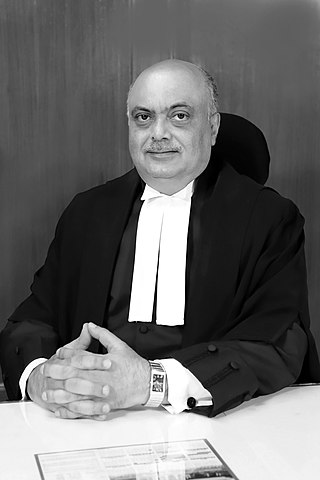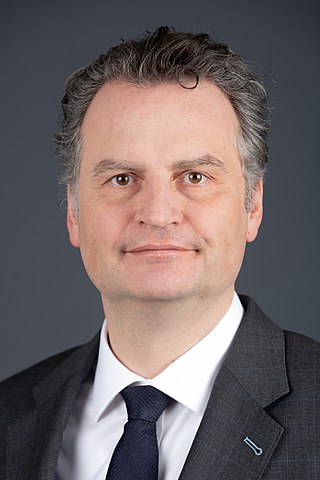Related Research Articles
Politics in Estonia takes place in a framework of a parliamentary representative democratic republic, whereby the Prime Minister of Estonia is the head of government, and of a multi-party system. Legislative power is vested in the Estonian parliament. Executive power is exercised by the government, which is led by the prime minister. The judiciary is independent of the executive and the legislature. Estonia is a member of the United Nations, the European Union, and NATO.

The politics of Finland take place within the framework of a parliamentary representative democracy. Finland is a republic whose head of state is President Alexander Stubb, who leads the nation's foreign policy and is the supreme commander of the Finnish Defence Forces. Finland's head of government is Prime Minister Petteri Orpo, who leads the nation's executive branch, called the Finnish Government. Legislative power is vested in the Parliament of Finland, and the Government has limited rights to amend or extend legislation. The Constitution of Finland vests power to both the President and Government: the President has veto power over parliamentary decisions, although this power can be overruled by a majority vote in the Parliament.
Politics of Macau is a framework of a politically constrained multi-party presidential system, dominated by the People's Republic of China. It includes the legislature, the judiciary, the government, and a multi-party system. Executive power is exercised by the government, led by the Chief Executive.
The Bailiff is the chief justice in each of the Channel Island bailiwicks of Guernsey and Jersey, also serving as president of the legislature and having ceremonial and executive functions. Each bailiwick has possessed its own bailiff since the islands were divided into two jurisdictions in the 13th century. The bailiffs and deputy bailiffs are appointed by the Crown on the advice of the Secretary of State for Justice and may hold office until retirement age.

The Government of India (GoI), constitutionally known as the Union Government and also called the Central Government, is the national authority of the Republic of India, a federal republic located in South Asia, consisting of 28 states and eight union territories.

The legal system of India consists of civil law, common law, customary law, religious law and corporate law within the legal framework inherited from the colonial era and various legislation first introduced by the British are still in effect in modified forms today. Since the drafting of the Indian Constitution, Indian laws also adhere to the United Nations guidelines on human rights law and the environmental law. personal law is fairly complex, with each religion adhering to its own specific laws. In most states, registering of marriages and divorces is not compulsory. Separate laws govern Hindus including Sikhs, Jains and Buddhist, Muslims, Christians, and followers of other religions. The exception to this rule is in the state of Goa, where a uniform civil code is in place, in which all religions have a common law regarding marriages, divorces, and adoption. Plus, recently, on February 7, 2024, the Indian state of Uttarakhand has also incorporated a uniform civil code. In the first major reformist judgment for the 2010s, the Supreme Court of India banned the Islamic practice of "Triple Talaq". The landmark Supreme Court of India judgment was welcomed by women's rights activists across India.
The court system of Canada is made up of many courts differing in levels of legal superiority and separated by jurisdiction. In the courts, the judiciary interpret and apply the law of Canada. Some of the courts are federal in nature, while others are provincial or territorial.

Under the Constitution of Finland, everyone is entitled to have their case heard by a court or an authority appropriately and without undue delay. This is achieved through the judicial system of Finland.

The judicial system of Turkey is defined by Articles 138 to 160 of the Constitution of Turkey.

David Laro was an American senior judge of the United States Tax Court.
Danske Lov is the title of a Danish statute book from 1683 that previously formed the basis for the Danish legislation. Even though it was mainly a compilation of older, regional laws, it took seven different commissions over several decades under two different monarchs to put the Code together. In 1687, Norway received its Norwegian Code, which in form and content is about identical to the Danish Code. The Danish Code has been translated into English, Latin, German and Russian.
Holger Gustafsson is a Swedish Christian Democratic politician, member of the Riksdag since 1991.

Somchai Wongsawat is a Thai politician who was the prime minister of Thailand in 2008 and a former executive member of the People's Power Party (PPP) whose political rights were disenfranchised by the Constitutional Court (ConCourt) for five years.

The judicial system of Sweden consists of the law of Sweden and a number of government agencies tasked with upholding security and rule of law within the country. The activities of these agencies include police and law enforcement, prosecution, courts, and prisons and other correctional services.

The judiciary of Scotland are the judicial office holders who sit in the courts of Scotland and make decisions in both civil and criminal cases. Judges make sure that cases and verdicts are within the parameters set by Scots law, and they must hand down appropriate judgments and sentences. Judicial independence is guaranteed in law, with a legal duty on Scottish Ministers, the Lord Advocate and the Members of the Scottish Parliament to uphold judicial independence, and barring them from influencing the judges through any form of special access.

Ahsanuddin Amanullah is a judge of the Supreme Court of India. He is a former judge of the Patna High Court. He has also served as a judge of the Andhra Pradesh High Court.

Till Steffen is a German lawyer and politician of Alliance 90/The Greens who has been serving as a member of the German Bundestag since the 2021 elections, representing the Hamburg-Eimsbüttel district.
Munib Akhtar is a Pakistani jurist who serves as justice of the Supreme Court of Pakistan since 8 May 2018.

Dirk Wiese is a German politician of the Social Democratic Party (SPD) who has been serving as a member of the Bundestag from the state of North Rhine-Westphalia since 2013.

Günter Krings is a German lawyer and politician of the Christian Democratic Union (CDU) who has been serving as a member of the Bundestag from the state of North Rhine-Westphalia since 2002.
References
- ↑ Former Members, European Court of Justice official website.